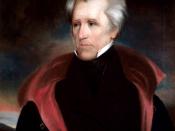In 1828, Andrew Jackson was elected president of the United States. The Jacksonian Democracy, or New Democracy, was thus created. The philosophy of this new form of democracy was that whatever governing was to be done was to be done directly by the people. The Jacksonian Democrats viewed themselves as the protectors of the Constitution, political democracy, individual liberty, and equality of economic opportunity. However, as shown through the National Bank, the Nullification Crisis, and the Native Americans' Trail of Tears, the Jacksonian Democrats achieved their democracy by engaging in events which were the opposite of what they stood for and by trampling over the system of checks and balances implied in the Constitution.
In 1832, Andrew Jackson stated that economic equality was his reasoning behind the veto for the recharter of the United States National Bank. This veto created the "Bank War."� As shown in Jackson's veto message (Doc.
B), Jackson claimed that by vetoing the bill to recharter the bank, he was looking after the economic equality of all United States citizens. Jackson believed that the bank was monopolistic, therefore unconstitutional, even though the bank was declared constitutional in the Supreme Court ruling of the McCulloch vs. Maryland case in 1819. This monopoly would favor the wealthy citizens and be detrimental to the poorer citizens. Thus, according to Jackson, the bank was not allowing for economic equality. Although much of Jackson's veto statement was accurate, he failed to mention all the commendable aspects of the bank. The idea that the National Bank was laudable is supported by Daniel Webster's reply to Jackson's veto message. (Doc. C) It issued sound bank notes, expanded the money supply, and created an abundant supply of sound currency. The bank was a safe place for the government to store, transfer, and disburse its...


